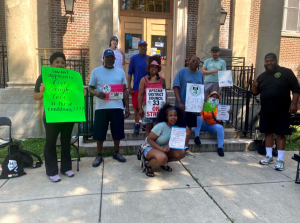I loved this module. It was so invigorating and inspiring to learn in the lecture and readings about all the innovative ways librarians have of forming community. Especially given libraries’ limited resources and recent attacks on libraries in politics right now, it can feel very difficult to cultivate these spaces.
Boyd’s Medium article, “What World Are We Building?” also inspired me to think critically about the limitations and prejudices that can sneak into even the most idealistic spaces if we aren’t proactive about safeguarding them (Boyd, 2016). Boyd writes, “We didn’t architect for prejudice, but we didn’t design systems to combat it either,” (Boyd, 2016). While Boyd is writing about data and internet architecture, this is a principle that can be applied quite broadly. Almost no one in library work would say they are aiming to perpetuate prejudices, but many unwittingly do. This can look like programming that excludes teens, limited hours that shut out working people, lack of accessible entryways and materials for disabled users, and countless other manifestations. As librarians, we need to make sure our good intentions don’t make us underestimate the size and significance of our blind spots.
I also can’t help but connect this week’s module to what is going on in my work life right now. Currently, the library assistant union in Philadelphia is on strike. This union (AFSCME 33) also includes trash collectors, water department workers, medical examiners, 911 operators, licensing officials, law clerks, paralegals, and others in municipal blue collar work. All this week I have been sitting outside of work watching the picket line (the librarians feel unsafe and are therefore unable to cross the picket line per our contract, so we are encamped across the street). While library work is of course not going on, I am really enjoying watching our patrons engage with the picket line. Several have come to the library, asked thoughtful questions about the strike, and then expressed support or even joined in picketing. I’ve seen regular patrons, many of whom are unhoused, engage in long conversations with strikers and volunteers, who are happy to speak to them and welcome them into community. These are certainly conversations that would not be happening without the existing rapport of library workers and patrons. Even in a situation like this, where library work is stopped, the library is a space of community connection and education. It speaks to the library as a modern town square and as essential democracy and workers’ rights education, as well as the beacon of wellness and anti-loneliness that Hasan envisions in their article where they talk about how the library is a non-judgmental and accepting place for all (Hasan, 2022). People feel welcome in the library, and with library workers. This goes a long way towards building community among neighbors, whether library work is actively happening or not.

Pictured above: Some strikers and allies/volunteers from the community on the picket line. Photo taken by an anonymous DC 33 striker.
References
Boyd, D. (2016). What world are we building? Medium. https://medium.com/datasociety-points/what-world-are-we-building-9978495dd9ad
Hassan, T. N. (2022). ‘Free, non-judgemental, accessible’: How your local library is a sanctuary of health and wellness. SBS Bangla. https://www.sbs.com.au/language/bangla/en/article/free-nonjudgmental-and-accessible-how-your-local-library-is-a-sanctuary-of-health-and-wellness/t15blzsi9
2 Comments
July 5, 2025 at 8:18 pm
@carlygove Thank you for sharing the information about the strike that you were involved in. It makes me very happy to hear the patrons are supporting and participating.
The image is not displaying and I took a look to see if it was an issue in your media library and I don’t know exactly what is going on but if you need help with that image and making it display, just let me know.
July 14, 2025 at 1:58 am
I think I fixed this!